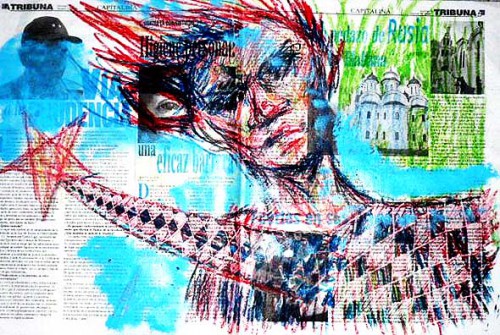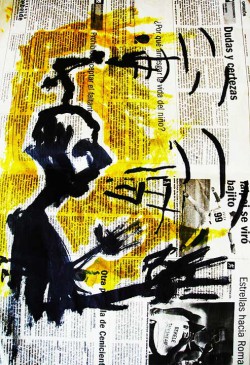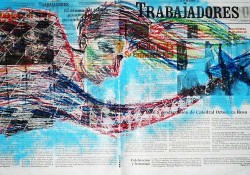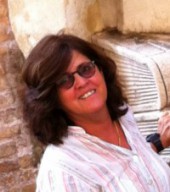Graphomania by Lien Carrazana Lau
by Sampsonia Way / September 20, 2013 / No comments
I heard your voice through a photograph
I thought it up it brought up the past
Once you know you can never go back
I’ve got to take it on the other side.
“Otherside,” Red Hot Chili Peppers.
It’s Sunday. Exactly eleven eleven when you first kiss me.
“Good morning, honey. Good morning, my love.” We stay like this a while, wrapped in the bed covers, with the tenuous light of a day much too gray and cold to be a Sunday in Havana.
We eat breakfast. As strange as it seems, it´s you who makes the coffee. I open the window and Havana’s winter displays its beauty before our eyes.
We go out dressed as if we were in Europe and these were not our only elegant winter coats. You carry your Nikon with new ammunition: An entire roll just for us, to squander at La Cabaña while we stroll through the fair, look at books, inspect the bookshelves, greet everyone we know, and ask anyone: “Could you take our picture?”
We take our picture on the wall that stretches before us as we contemplate Havana from above. We feel superior being above a sea of people that passes by on the streets below. We drink a beer while we look at the sea, and when a vessel appears at the perfect time, we make plans over the plans that we had already made.
- Lien Carrazana Lau
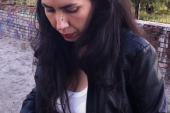
- Fiction writer, digital editor, painter, graphic designer.
- She is the webmaster of Liencarrazana.com and La China Fuera de la Caja. She holds a BS degree in San Alejandro Fine Arts Academy. Her stories have been included in anthologies, such as Vida laboral y otros minicuentos (Caja China, 2006), and in the literary magazine El Cuentero. She is member of the staff of the opinion, literary and news website Diario de Cuba. She resides temporarily in Madrid.
- Read more…
I smile for your lens; the wind musses my hair, which I am growing longer to please you. I am trying to ignore the superstition that every time I let my hair grow something happens, something ends or turns out badly. I look at my hair. It is shoulder length already, and some of that disjointed fear comes back, but I prefer to believe that this time it will be different.
I buy a small book of sonnets. I harbor a secret hope that I will scrutinize the author in his words and peel back that false veil that we put between ourselves and others. I stop by the author’s table to get his autograph. You greet him; he is someone you’ve known for a long time. You introduce me as your girlfriend, your longtime girlfriend. This always makes me feel young, yet sometimes I have trouble imagining being introduced as your girlfriend four years from now, with a child in a baby carriage, but right now there’s no child and no baby carriage, nor have four years passed by.
The sun begins to set (as they say in poorly written stories) but to us it seems a logical shift towards nightfall. We return to the large mass of cement. I see the tunnel’s lights, orange and expectant, and it’s like returning to the maternal womb, like opening my eyes right now and to have traveled from this recliner, and without opening my eyes, to still continue traveling to the exact point in which opening my eyes will mean tears.
Warm tears flow from my eyes, allowing themselves to trickle with desires which vanish with the light that brings me back to this tacit room, filled with photographs scattered all over the floor. But I know that opening my eyes and crying will be part of the process of imagining everything, absolutely everything, and I wouldn’t be able to cry again, I wouldn’t need to cry since I have already done so in my mind.
You are right: Writing is useless; it is a repetition of that which you have already done with your thoughts. That is why you do not write. Is it better to leave everything to the imagination and to life itself?
I don’t know. I contradict my own thoughts. I attack these pages with my graphomania, prostituting sleep into a vigil, and I transport it to these cells covered with words. I, and only I, am responsible for my life, the life that no one wrote for me and that is why it’s so difficult to act out some makeshift role.
Perhaps I was born cursed. But no, I don’t think so. We don’t have executioners, curses, wars that depend on us. We are not children struggling for a crown. We are only dust in the wind, just like melody coming form the radio, when everything is extremely calm outside, and yes, I do feel like dust in the wind, dust that floats in a spiral over this island.
I am just another young girl scribbling ideas in a notebook bought for 3.05 CUC (an easily exchanged currency: In shit, just like colonial bonds). Yesterday, in a post-orgasm haze you said, I said, we both said: “I don’t want to live a fictional life, to buy make- believe food with make-believe money in a make-believe store.”
But the reality is, that fictional or real, life leaves its traces on us. The head begins turning grey, hair falls out and we are here, inside this room, where the savage clarity brought on before orgasm brings music and hostile shadows to my mind. For me, many Cubas exist. For you, there’s only one. In reality, there’s only one. This hot country, peopled with workers and vagabonds, with altruistic men and despots, with writers and waitresses, with hangers-on and teachers, with violators and men who follow the law, with pioneers and foreigners. The Cuba of the Festival and the Arts, the revolutionary myth, the terrestrial dinosaur, a seawall that traces borders around my ideas, but again I am mistaken, you are right, only one Cuba exists.
All the Cubas I see with each eye are nothing more than a subtle trap in this fictional game. I am assuming this; I was born surrounded by portraits of illustrious men. I am an unbreakable doll. “Take me; do with me whatever you want, indoctrinate me, give me a destiny, a death, an ideology…” This was written upon my forehead from the beginning.
I get comfortable in the recliner and grab a handful of photographs. Yellowed photographs. My Chinese grandfather in a visa-sized photo. I read the back: Taken August 10th, 1958. This is the only image I have of my grandfather. I never knew him; all I have is this photo. His face is long and serious. His eyes are sad, nostalgic, questioning.
I look for a visa-sized picture of me. I look at my face and for the first time I realize that I resemble him. Something deep in my eyes is also found deep in his eyes. My smile is crooked on the left side, just like his. Maybe, against all predictions, I could be the one that looks most like him in our family. Like that inscrutable Chinese man that landed on our island when he was only 18, and changed his unpronounceable name to the more western Jose, that man whose oriental last name my offspring will not inherit, just like they will not inherit his/my smile or that mystery that no one will know in its entirety: Our I, our real name that we carry inside like a treasure that can never be usurped.
Gray photos. Pictures of my mother’s fifteenth birthday party, a huge table full of sweets, sodas, an enormous cake, a group of boys and girls around my mother at the center of the composition. My mother: An adolescent girl with short hair, a necklace made from seeds, and the clothing of someone engaged in the alphabetization campaign. My mother: a young woman of her time, the future of the nation.
I don’t have any photos of my fifteenth birthday celebration. I didn’t care for rented long dresses, or the poses. In my fifteenth birthday there was no costume as authentic as my mother’s had been. Cuba was already a country free from illiteracy and turning fifteen meant nothing like before when you were “presented to society.” The nation was immovable like a turtle asleep in the Caribbean.
Color photos. My lyrical years: The beginning of my youth, my innocent years. A picture of me at twenty. Varadero Beach. On the sand is written the word: LONELINESS. The beach is perfect: The water transparent, the sky an impeccable blue, the sand finer than salt. But I was alone; you were not on the other side of the lens like you are now looking at me sitting in this recliner, surrounded by photos, with the window open to a gray and familiar Havana.
- The Writer Speaks
- Lien Carrazana Lau in her own words
- “ Is it asking too much to have a place in time, a space in the minds of those who really can change the world (a little at least)?
- ”
“You enjoy constructing catastrophes,” you say with a smile. I like stirring up the past. Once I tried using one of the photos as a portal to return there, but that is no longer possible, I am outside of everything. I live in this consciousness, at the end of the lyrical age. And it is much better like that.
The red recliner is my own private island. From my shore I see you on the other side of the lens; from my recliner-island I am like a shipwrecked person waving her little flag in the direction of your ship. You blink like the flash of the Nikon. My photo watches you waiting for the morning coffee, the winter that does not exist in this tropical Havana, going together to the fair. The photos that we do not have. “I only have black and white rolls, honey; besides, look how sunny it is today, you know what the fair must be like on a Sunday,” you say and your ship retreats, leaving me for the computer.
I go out. Squeezed by these four walls, I am unable to breathe. Mud walls full of holes that filter sounds, water, restlessness. I can’t find peace. Peace doesn’t exist outside, in any place where I am now. A stream of people moves over its absence. I am sad. My sadness is a downpour falling on these people, the words bouncing in my brain. It is the city in pieces, asphyxiated, agonizing in amnesia. I scream inside, but my voice is extinguished in my guts.
I walk with the crowd. The Book fair, words fair, thoughts fair. People buy bread, beer. They smoke, fall in love, stand in line, smile, dance, recite poetry, take pictures by the seawall with Havana in the background. Among them I walk. I walk as if I were a transparent woman. Each drop of water pierces me and dissolves part of me into the sea, into the air, into the black earth, into the faces, into the footsteps, into the amorphous body of the multitude.
A book. I want to find a book among the many. It would be like finding a gem we believed to be extinct. I remember the presentation for the book of sonnets. The author has a Jewish last name, a magical profile, and wears his shirts tucked in. I didn’t like the sonnets. They fail to bring me to the other side. I left the book on the table where the author was signing them.
I walk from one pavilion to another. In olden times it was a prison for bodies, today a prison for words. I don’t find anything, only writers and readers gathered in each corner of Cabaña Fortress. There’s only a precipice. I sit at the edge and imagine my body falling and getting squashed in the grass below. In the very spot where they shot someone who also wanted to, one day, find a book that would save his life. Perhaps he found it, and because of that book he decided to die.
I return to the city. It is raining. Down Obispo Street, the same strip full of legs, arms, shoulders, hips: The crowd under the cold February rain. My tears mix with the rain like a theatre curtain that hides my sadness. But nobody notices. I can cry in front of everyone because nobody sees me. I am dissolved into the evening, the cobblestones, the umbrellas.
I turn right on Havana Street. The Belen district. The Black quarter, a poor area, my neighborhood. I walk down my street. Music submerges my ears in an inescapable sentence. The reggaeton of my neighbor on the corner returns me to my habitat. The rain water makes the odors of dried flowers and the rotten food in the garbage cans seem more pungent. Mud reaches my feet. I am a lotus flower again.
I go up the stairs. My anguish diminishes with each step up. “Otherside” can be heard through the door; the music of the Red Hot Chili Peppers brings me back to you. Inside it’s hotter than hell. You sweat in front of the fan as you clean your camera’s lens. “Did you buy a book?” you ask, looking at my wet hair falling over my shoulders.
I don’t answer. I smile at you and go inside the bathroom. For an instant my eyes scrutinize the other I in the mirror. I look at myself wanting to enter, to fuse with, to penetrate the center of my being. Return to myself. I leave the bathroom. I sit at the computer: “There is no better place than oneself.”
I start typing so I can find this book that I need to find. Tomorrow will be Monday and the book fair will close. Tomorrow I will cut my hair so that nothing bad happens with us. I will buy a roll of color film. I want to see the city from the lighthouse; I will ask you to take me to El Morro Castle, the phallus of this hermaphroditic Havana, a lit Habano cigar going around in circles looking for penetration. “Penetrate me, stranger,” whispers Havana the whore from her vaginal harbor.
I will spread my legs so that your lens will coagulate me along with him/her (Havana/Habano) and we all remain forever caught in the memory. Tomorrow the umbilical cord that ties me to this recliner and to this, my fiction, and to my death from words, will break. Tomorrow I will have my freedom stamped in a passport and my grandfather’s smile upon my lips. Because tomorrow, my love, today’s time will be over.
Edited in English by Joshua Barnes
__________
All facts and characters appearing in this work are fictitious. Any resemblance to real persons, living or dead, is purely coincidental.
Los hechos y/o personajes de esta historia son ficticios, cualquier semejanza con la realidad es pura coincidencia.
Leer en español
__________

